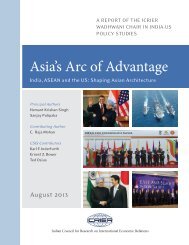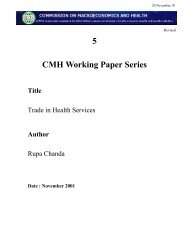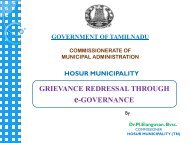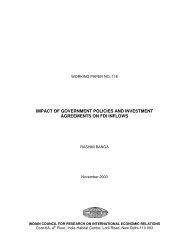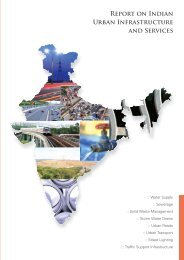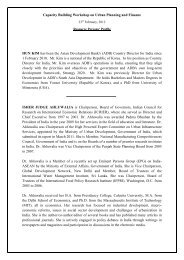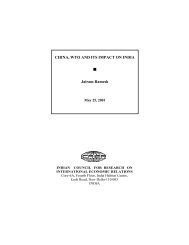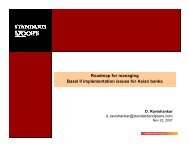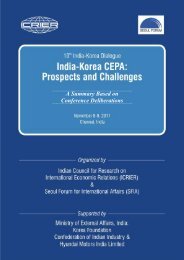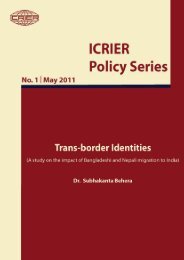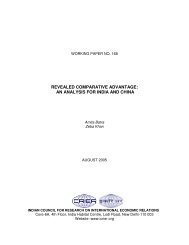Arpita Mukherjee Ramneet Goswami January 2009 - icrier
Arpita Mukherjee Ramneet Goswami January 2009 - icrier
Arpita Mukherjee Ramneet Goswami January 2009 - icrier
Create successful ePaper yourself
Turn your PDF publications into a flip-book with our unique Google optimized e-Paper software.
eforms. Although many nations have privatized their electricity industries since the 1990s<br />
(or are currently undertaking such efforts), the UK’s electricity privatization effort has been<br />
among the world's most ambitious and path-breaking. Several countries have followed the<br />
UK experience as a policy guide in their own electricity restructuring, privatization, and<br />
regulatory reforms. For instance, Norway, Argentina and Australia have adopted variations of<br />
the UK model. Among other European nations, Hungary too adopted an ambitious<br />
privatization program in 1991; the state-owned electricity companies were privatized and<br />
foreign participation in electricity companies were allowed. Other countries to privatize<br />
include the Czech Republic, Poland and Russia. In Asia, countries such as India, China,<br />
Indonesia, Malaysia, Pakistan and Nepal introduced private participation in electricity mainly<br />
through private financing of new generation capacity in the form of Independent Power<br />
Producers (IPPs). 51<br />
Liberalized markets have provided new opportunities for private-sector firms to<br />
compete in the development and construction of energy infrastructure around the world. IPPs<br />
are now an important means of expanding generation capacity, introducing competition into<br />
the generation business, and transferring some risks from the public sector to the private<br />
sector. It also provided opportunities for private sector firms to enter into wholesale<br />
electricity trading arrangements, electricity pools, brokering of electricity, and other energy<br />
products.<br />
The liberalization experience shows that most countries are willing to introduce<br />
competition in the generation and the distribution sector, while retaining some control over<br />
the transmission network (infrastructure). On the other hand, post-liberalization, low-cost and<br />
small-scale generation units were allowed to produce electricity closer to end-users to reduce<br />
the reliance on transmission and distribution networks. Liberalization also resulted in a<br />
growing convergence of petroleum-related activities and electricity-related activities, due to<br />
significant improvements in the efficiency of gas-fired electricity generation units. Moreover,<br />
in many countries such as the UK, natural gas deregulation was accompanied by deregulation<br />
of electricity.<br />
The privatization process brought about a shift from a market characterized by a few<br />
service providers and captive customers to one with an array of choices and participants.<br />
This, in turn, created a number of new opportunities in competitive segments of production<br />
and marketing. In the UK, in the decade following electricity privatization, from seven<br />
vertically integrated regional monopolies there were 42 generation companies and 29<br />
licensed marketers. 52<br />
Competition enabled consumers to choose their service providers on the basis of price<br />
and quality. In the UK, competitive marketing was introduced in three stages: to large<br />
consumers in 1990, to medium-sized consumers in 1994, and to domestic consumers in 1998.<br />
By 2000, nearly 81 per cent of large consumers and 38 per cent of residential consumers had<br />
switched to a new electricity marketer. 53<br />
51<br />
An IPP is a privately-owned power producer. IPPs are recognized as an important means of expanding<br />
generation capacity, introducing competition into the generation business, and transferring some risks from<br />
the public sector to the private sector. They are often the first private investors in a power market dominated<br />
by state-owned power utilities and they can enter the wholesale power market under any of the market<br />
structures.<br />
52<br />
UNCTAD (2003).<br />
53<br />
UNCTAD (2003).<br />
17




